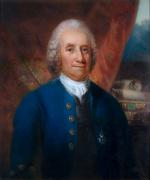Disable ads!
Emanuel Swedenborg
Part of a series on Spirituality Outline Religion History Timeline Traditional Christian (Catholic) Mysticism Modern "Spiritual but not religious" Syncretism New religious movement Practices Spiritual practice Religious experience Esotericism Influences Western Proto-Indo-European religion Panpsychism Hermeticism Neoplatonism Illuminationism Mysticism Esoteric Christianity Western esotericism Perennial philosophy Occultism Age of Enlightenment Pietism Emanuel Swedenborg Romanticism Spiritualism Liberal Christianity German idealism Transcendentalism Universalism New Thought New Age Orientalist Orientalism Comparative religion Theosophical Society Nondualism Asian Proto-Indo-Iranian religion Enlightenment Neo-Vedanta Vipassana movement Buddhist modernism Psychological Humanistic psychology True self and false self Self-realization Self-help Positive psychology Mindfulness Category v t e Emanuel Swedenborg (/ˈswiːdənˌbɔrɡ/; Swedish pronunciation (help·info); born Emanuel Swedberg on 29 January 1688; died 29 March 1772) was a Swedish scientist, philosopher, theologian, revelator, and mystic. He is best known for his book on the afterlife, Heaven and Hell (1758). Swedenborg had a prolific career as an inventor and scientist. In 1741, at age 53, he entered into a spiritual phase in which he began to experience dreams and visions, beginning on Easter weekend of 6 April 1744. This culminated in a 'spiritual awakening', in which he received revelation that he was appointed by the Lord to write The Heavenly Doctrine to reform Christianity. According to The Heavenly Doctrine the Lord had opened Swedenborg's spiritual eyes, so that from then on he could freely visit heaven and hell and talk with angels, demons and other spirits; and the Last Judgment had already occurred, in 1757. However, he tells us that at this day it is very dangerous to talk with spirits, unless a person is in true faith, and is led by the Lord. For the remaining 28 years of his life, Swedenborg wrote eighteen published theological works, and several more which were unpublished. He termed himself a "Servant of the Lord Jesus Christ" in True Christian Religion, a work he published himself. Some followers of The Heavenly Doctrine believe that, of his theological works, only those which Swedenborg published himself are fully divinely inspired.
 Read more on wikipedia.org Read more on wikipedia.org
 All quotes by Emanuel Swedenborg All quotes by Emanuel Swedenborg
 Edit Edit
|

|
|
|
|
|
Background photo by Giuliana
|